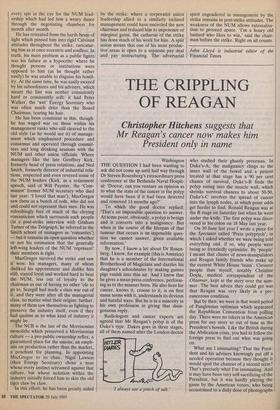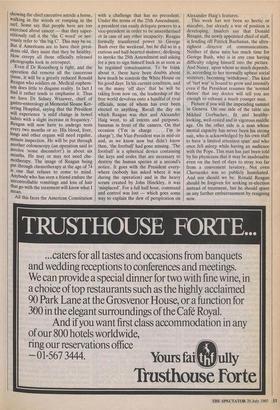THE CRIPPLING OF REAGAN
Christopher Hitchens suggests that
Mr Reagan's cancer now makes him President only in name
Washington THE QUESTION I had been wanting to ask did not come up until half way through Dr Steven Rosenberg's extraordinary press conference at the Bethesda Naval Hospit- al: 'Doctor, can you venture an opinion as to what the state of the cancer in the polyp would have been if it had been detected and removed 14 months ago?'
To which the good doctor replied: `That's an impossible question to answer. At some point, obviously, a polyp is benign and it converts into a malignancy. But when in the course of the lifespan of that tumour that occurs is an impossible ques- tion we cannot answer, given available information.'
By now, I know a lot about Dr Rosen- berg. I know, for example (this is America) that he is a member of the International Brotherhood of Magicians and dazzles his daughter's schoolmates by making guinea pigs vanish into thin air. And I know that he gives a mean press conference, perform- ing as to the manner born. He also lives for cancer, knows it, croons to it, is on first name terms with it, understands its devious and hateful ways. But he is in a minority in his own profession in giving that disin- genuous reply.
Radiologists and cancer experts are agreed that Mr Reagan's polyp is of the Duke's type. Dukes goes in three stages, all of them named after the London doctor who studied their ghastly processes. In Duke's-A, the malignancy clings , to the inner wall of the bowel and a patient treated at that stage has a 90 per cent chance of survival, Duke's-B finds the polyp eating into the muscle wall, which shrinks survival chances to about 50-50, Duke's-C involves the spread of cancer into the lymph nodes, at which point odds get harder to find. Ronald Reagan was at the B stage on Saturday last when he went under the knife. The first polyp was disco- vered in his colon on 18 May last year.
On 30 June last year I wrote a piece for the Spectator called 'Press polyptych', in which I asked whether we were being told everything and, if so, why people were being so frenziedly optimistic. By 'people' I meant that cluster of news-manipulators and Reagan family friends who make up the current White House 'team'. Cleverer people than myself, notably Christine Doyle, medical correspondent of the Observer, kept at the story over the sum- mer. The best advice they could get was that Reagan was very likely in a pre- cancerous condition.
But by then, we were in that weird period of Panglossian optimism which separated the Republican Convention from polling day. There were no takers in the American press for any story so out of tune as the President's bowels. Like the British during the Abdication crisis, you had to follow the foreign press to find out what was going on.
What am I insinuating? That the Presi- dent and his advisers knowingly put off a needed operation because they thought it would spoil the chances of a second term? That's precisely what I'm insinuating. And it may have been very self-sacrificing of the President, but it was hardly playing the game by the American voters, who being accustomed to a daily dose of photographs
I always use a pinch of salt.'
showing the chief executive astride a horse, walking in the woods or romping in the surf. Some say that people here are too exercised about cancer — that they super- stitiously call it the 'the C word' or ner- vously refer to 'the big C'. This may be so. But if Americans are to have their presi- dents old, they insist that they be healthy. How creepy all those officially released photographs look in retrospect. Even if Dr Rosenberg is right, and the operation did remove all the cancerous tissue, it will be a greatly reduced Ronald Reagan who soldiers on. Medical euphem- ism does little to disguise reality. In fact I find it rather tends to emphasise it. Thus we have Dr Sidney Winawer, chief of gastroenterology at Memorial Sloane Ket- tering Hospital, saying that the President will experience 'a mild change in bowel habits with a slight increase in frequency.' Reagan will now have to undergo tests every two months or so. His blood, liver, lungs and other organs will need regular, minute inspection. He will be put through another colonoscopy (an operation said to involve 'some discomfort') in about six months. He may or may not need che- motherapy. The image of Reagan being put through chemotherapy at the age of 74 is one that refuses to come to mind. Anybody who has seen a friend endure the uncontrollable vomitings and loss of hair that go with the treatment will know what I mean.
All this faces the American Constitution with a challenge that has no precedent. Under the terms of the 25th Amendment, a president can easily delegate powers to a vice-president in order to be anaesthetised or in case of any other incapacity. Reagan formally transferred power to George Bush over the weekend, but he did so in a curious and half-hearted manner, declining to invoke the 25th Amendment and asking for a pen to sign himself back in as soon as he regained consciousness. To be frank about it, there have been doubts about how much he controls the White House on his good days. In his current condition, and on the many 'off days' that he will be taking from now on, the leadership of the free world devolves onto a handful of rival officials, none of whom has ever been elected to anything. Recall the day on which Reagan was shot and Alexander Haig went, to all intents and purposes, bananas in front of the camera. On that occasion (`I'm in charge . . . I'm in charge'), the Vice-President was in mid-air and, as we know now but didn't know then, 'the football' had gone missing. 'The football' is a spherical device containing the keys and codes that are necessary to destroy the human species at a second's notice. It goes with the President every- where (nobody has asked where it was during the operation) and in the heavy scrum created by John Hinckley, it was `misplaced'. For a full half hour, command and control was lost — which goes some way to explain the dew of perspiration on Alexander Haig's features.
This week has not been so hectic or macabre, but already a war of position is developing. Insiders say that Donald Reagan, the newly appointed chief of staff, is fending off Patrick Buchanan, the ultra- rightest director of communications. Neither of these men has much time for George Bush, who is in any case having difficulty edging himself into the picture. And Nancy, upon whom so much depends, is, according to her normally upbeat social secretary, becoming 'withdrawn'. This kind of 'turf war' is bound to grow and intensify even if the President resumes the 'normal duties' that any doctor will tell you are enough to exhaust a much younger man.
Picture if you will the impending summit in Geneva. On one side of the table sits Mikhail Gorbachev, fit and healthy- - looking, well-rested and in vigorous middle age. On the other side is a man whose mental capacity has never been his strong suit, who is acknowledged by his own staff to have 'a limited attention span' and who once fell asleep while having an audience with the Pope. This man has just been told by his physicians that it may be inadvisable even on the best of days to stray too far from a convenient lavatory. Not even Chemenko was so publicly humiliated. And nor should we be. Ronald Reagan should be forgiven for seeking re-election instead of treatment, but he should spare us any further embarrassment by resigning now.



















































 Previous page
Previous page